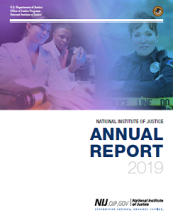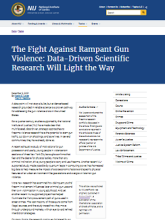Project Safe Neighborhoods (PSN)
What Works to Reduce Violent Gun Crime in Focused Deterrence Initiatives? Estimating the Effect of Services and Enforcement in Facilitating Desistence Among Prolific Violent Offenders
National Institute of Justice Fiscal Year 2019 Annual Report
Examining the changing dynamics of homicide in Los Angeles: 1990 - present
What works to reduce violent gun crime in focused deterrence initiatives? Estimating the effect of services and enforcement in facilitating desistence among prolific violent offenders in Tampa
Multilevel Evaluation of Project Safe Neighborhoods
Project Safe Neighborhoods (PSN) is a DOJ-sponsored initiative to reduce violent crime, particularly gun crime, by fostering cooperation by criminal justice agencies and local partners to develop and implement strategic approaches.
See the YouTube Terms of Service and Google Privacy Policy
The Fight Against Rampant Gun Violence: Data-Driven Scientific Research Will Light the Way
Multilevel Evaluation of Project Safe Neighborhoods
Project Safe Neighborhoods and Violent Crime Trends in US Cities: Assessing Violent Crime Impact
NIJ Year in Review 2002
Notes From the Field: Using Evidence-Based Policing to Combat Violent Crime
Notes From the Field: Using Evidence-Based Policing To Combat Violent Crime
Evaluation of Project Safe Neighborhoods
Evaluation of Project Safe Neighborhoods
Don't Jump the Shark: Understanding Deterrence and Legitimacy in the Architecture of Law Enforcement
Deterrence theory dominates the American understanding of how to regulate criminal behavior but social psychologists' research shows that people comply for reasons that have nothing to do with fear of punishment; they have to do with values, fair procedures and how people connect with one another. Professor Meares discussed the relevance of social psychologists' emerging theory to legal theory and practice and how deterrence and emerging social psychology theories intertwine.
See the YouTube Terms of Service and Google Privacy Policy
Gang Membership Prevention
The Centers for Disease Control and Prevention and NIJ collaborated on a book that focuses on promising principles for gang membership prevention. This NIJ Conference Panel discusses the risk and protective factors that influence gang membership as well as efforts to reduce such factors. Panelists also explored the direction of gang research for the future.
Chicago Ceasefire - Postplenary Session at the 2009 NIJ Conference
CeaseFire is an evidence-based, data-driven intervention designed to stop shootings and killings in high-incidence neighborhoods by directly intervening with those who are most likely to be involved in a shooting and by building support for alternatives to violence in those neighborhoods. Panel members will share their experiences “on the ground” mediating conflicts and working one-on-one with high-risk individuals.
What Is Research and Evaluation Evidence and How Can We Use It?
This NIJ Conference Panel will explore the development and use of evidence-based policies, programs and technologies to improve effectiveness and efficiencies related to government. Through casual observation, practices and programs may appear to be effective, but under closer scrutiny the results may look much different.




